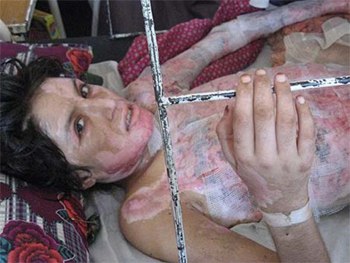IRIN News, October 16, 2007
Widespread child marriage blamed for domestic violence
"As I filed for divorce the police arrested me and put me in prison"
KANDAHAR - Fifteen-year-old Razia (not her real name) has been imprisoned in Kandahar Province, southern Afghanistan, for escaping from her husband's house and eloping with another man.
She was only 12 when her father married her to an elderly man for a significant dowry payment. "He [her husband] was very brutal and was treating me violently," Razia said.
Video clip of violence against a child given in forced marriage. (more RAWA clips ( http://www.youtube.com/rawa77 ))
"No one was helping me escape my husband's cruelty," the distraught teenager said, adding that her only resort was to elope with a young man whom she thought would give her a new life.
Months later Razia registered for divorce from her elderly husband. "As I filed for divorce the police arrested me and put me in prison," she told IRIN.
Not only is elopement unlawful for a married woman in Afghanistan, it is also taboo.
It is unclear how long Razia will remain in prison. She could be sentenced to death or get 10-15 years. Sexual relations outside marriage are considered a serious offence in Afghan civil law, which is derived from Islamic Sharia law.
Afghanistan recently ended a three-year moratorium on the death penalty.
If sexual relations outside marriage are not proved, she could still face an unspecified sentence for running away from her home with a stranger ('na-muhram'), said Kandahar judge Haji Karim.
Poverty, illiteracy exacerbate problem
Research by the Afghanistan Independent Human Rights Commission (AIHRC) shows that over half of marriages in southern Kandahar Province are in essence child marriages.
"A vast majority of families [in Kandahar] wed their daughters before their legal age [16]," said Najiba Hashimi, an AIHRC official.
Child marriage is prevalent, rights activists say, but the degree to which it is practiced varies from province to province according to different levels of public awareness and local customs.

Bora Gull Heha, 16 years old, lies in a hospital bed in Kandahar. When the abuse became intolerable, Heha took what she though was her only way out. She grabbed an oil lamp and set herself ablaze. (CP PHOTO/Stephanie Levitz)
According to the AIHRC, conservative traditions, widespread illiteracy among parents (up to 70 percent of Afghanistan's 24.5 million people are reportedly illiterate) and nationwide poverty are some of the factors driving families to wed their underage daughters.
Up to 70 percent of registered cases of violence against women have their origins in early marriages, Hashimi said.
"Young children and teenagers often do not fully realise the complexities of marriage and mostly fail to comply with their wedding vows, and this can lead to both physical and mental violence," said Fawzia Amini, director of the legal affairs department at Afghanistan's Ministry of Women's Affairs.
Child marriage is also considered to be contributing to the country's high maternal and child mortality rates, health experts say.
Long-term problem
Suraya Subhrang, a women's rights expert working for the AIHRC, says child marriage is a complex social phenomenon which can only be tackled by the long-term educational, economic and cultural development of the whole Afghan nation.
"We need strong institutions to ensure the rule of law in society and reliable access to justice for all, regardless of gender," Subhrang told IRIN.
Until such institutions are built up, widespread illiteracy is tackled, and viable protective mechanisms established for Afghan girls and young women, predicaments such as those faced by Razia will remain an unfortunate reality, rights activists say.
Characters Count: 4903
